Reflections of former Presidents of the European Parliament: Pat Cox
The mission of President of the European Parliament is easier to describe than to fulfil. In marking the institution’s fiftieth anniversary at the invitation of my friend, former colleague and successor, President Hans-Gert Pöttering, by reflecting on some key moments, there were many to choose from. Revisiting a speech delivered at the end of my mandate recalled the intensity of the role. Yet through all of this there was one constant heartbeat. It began in the year of my election to the Parliament when I could neither anticipate nor imagine ever having the privilege of being President. Nineteen eighty nine was a special year, an annus mirabilis.
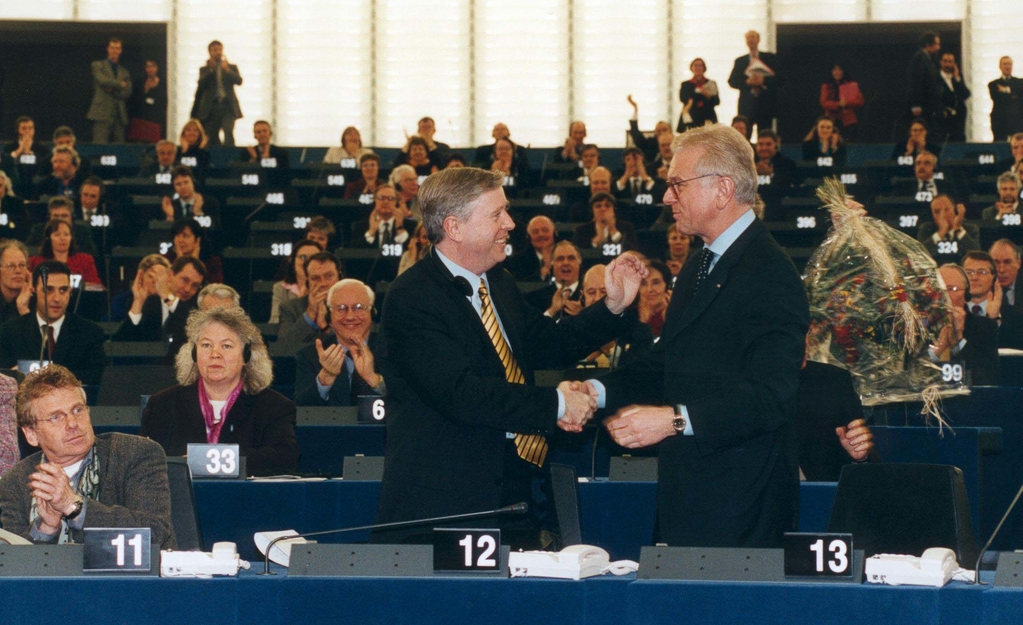 Plenary session in Strasbourg - Election of Pat Cox as EP President © European Union 2002 – European Parliament
Plenary session in Strasbourg - Election of Pat Cox as EP President © European Union 2002 – European Parliament
For the peoples of Central and Eastern Europe it was the year that marked a new beginning. When the Berlin Wall collapsed on 9th November 1989 decades of yearning for freedom found expression. It carried echoes from the streets of Budapest in 1956 to the decade long courageous struggle of Solidarnosc in Poland. It carried through to Prague’s Velvet revolution and to the singing revolutions in the Baltic States. It led to the eventual implosion of the Soviet Union and to German re-unification. The spirit of what happened in Berlin that November was a breath of fresh air. As a first time MEP, elected only months earlier, I breathed in its intoxicating oxygen of change. By the time I had the privilege to serve as President of the European Parliament in 2002 the maturing pathway of these states and peoples towards their EU accession had reached its moment of definition. Bringing together a Europe, divided by the oppressive weight of history and not by choice, to share common values and prosperity was the overarching political priority and consuming passion of that mandate.
As parliamentarians we contributed much to that task. Through the dedicated work of the Foreign Affairs Committee and its rapporteurs, through the actions of the Joint Parliamentary Delegations and the Political Groups, through the Bureau and the Conference of Presidents, the European Parliament helped to move the debate on from the unavoidable monotony of the acquis communautaire to the vitality of the moment. We brought the animation of parliamentary politics to bear on the challenge.
We encouraged the necessary compromises within and between the European institutions and the member and accession states. We reached agreement on the budgetary and financial perspectives needed to accommodate this historic change. We sought to communicate a sense of the excitement of the project to public opinion. We gave our assent to the Accession Treaty, an indispensable prerequisite for its adoption by the national parliaments. We did all that duty demanded of us and we did more.
The accession states themselves were going through an extraordinary double transformation as they travelled from communism to market economy towards their membership of the European Union. Their leaders and their parliamentarians carried a heavy responsibility. In a symbolic pre-accession act of political solidarity, the European Parliament invited the participation of observer MPs from all the candidate states. We first met in Strasbourg in November 2002 before the important staging post of the Copenhagen Summit that December, observing that it would give us in the European Parliament the opportunity to cope with Europe’s new political and cultural diversity and respectively allow us to engage in a process of mutual understanding and political socialisation. It was an early investment in the necessary relationship building at a personal, political and institutional level and an early rehearsal for a future reality.
Introducing that debate I remarked that: ‘As politicians we are challenged before history successfully to conclude this truly continental scale act of reconciliation and healing. As parliamentarians we are challenged to give leadership, to win the calculus of public consent in the member states and the accession states alike. There is no public relations or information campaign that substitutes for real politics based on conviction and reason. Now is the time for politicians to repossess the enlargement agenda from the experts who have prepared the way.’
In an historic vote on 9 April 2003, Parliament adopted a resolution on the conclusion of the negotiations on enlargement in Copenhagen and formally gave its assent to the membership applications of the ten states that had completed their negotiations. This enabled the Accession Treaty to be signed at a special event in Athens only days later. That was when, in an unprecedented step, members of the national parliaments of all the acceding countries were invited to participate regularly in the work of the European Parliament as observers, from 1 May 2003 until their accessions were fully realised. As the process of enlargement deepened it took on an inclusive and irreversible character. In matters of content and calendar the European Parliament throughout this period was a leader and not just a follower of events.
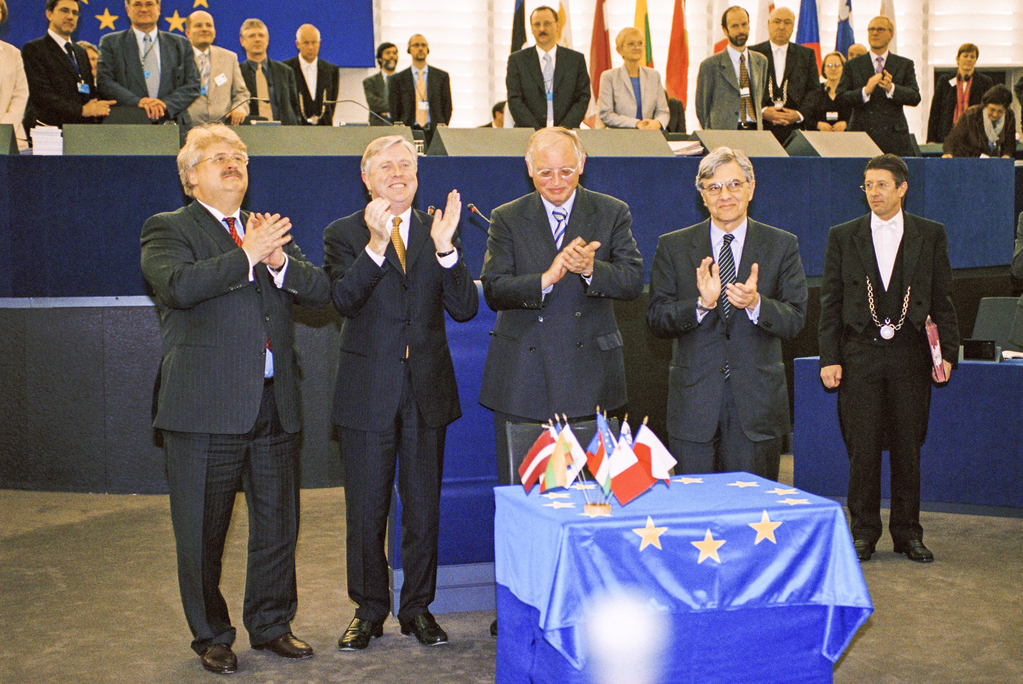 Plenary session at the European Parliament in Strasbourg - Signature ceremony of the Accession Treaty. Pictured (L-R): Elmar Brok, Pat Cox, Gunter Verheugen, Reinhard Rack © European Communities 2003 – European Parliament
Plenary session at the European Parliament in Strasbourg - Signature ceremony of the Accession Treaty. Pictured (L-R): Elmar Brok, Pat Cox, Gunter Verheugen, Reinhard Rack © European Communities 2003 – European Parliament
It was a source of a great pride to me, as an Irish European, that when the new European Union of 25 was born officially, it should be celebrated in Dublin on 1 May 2004 during such a successful Irish EU Presidency. However, as European Parliament President, my sense of duty would have been to do so in Parliament in Strasbourg just weeks before the continental scale upcoming parliamentary elections in June of that year, underlining its role as the theatre of European politics. Preferences for participation in traditional May Day events and weekend electoral imperatives ensured that months in advance no consensus was available among the parliament’s leadership for this latter proposition. So it was that on Monday 3 May 2004 in Strasbourg the European Parliament marked the dawn of its new era.
The entrance to the Parliament in Strasbourg greeted the visitor with sixteen tall flagpoles flying the twelve gold stars of the European Union and the national flags of the fifteen member states. Ten new states would necessitate ten new flagpoles. These were of a sufficient size and potential price as to require, under EU law, a public tender. This in its turn could be won by any number of suppliers from any number of states. Symbolically, in my view, these had to come from only one place, the shipyards of Gdansk. Months earlier this led me to discuss the possibility with the Polish Prime Minister, Lezek Miller, of a gift of the flagpoles from Poland. To my great delight he agreed immediately. When we gathered in Strasbourg late on the first afternoon of this final session before the European Parliament elections of 2004 the gifts to Europe from Gdansk stood tall ; Lech Walesa, whose moral courage and fortitude personified the struggle for freedom; the value and values of Solidarity now consummated by this ambitious accession and the flagpoles themselves, sturdy and silent witnesses, awaiting the symbolic parliamentary unfurling of the Union’s newest member states.
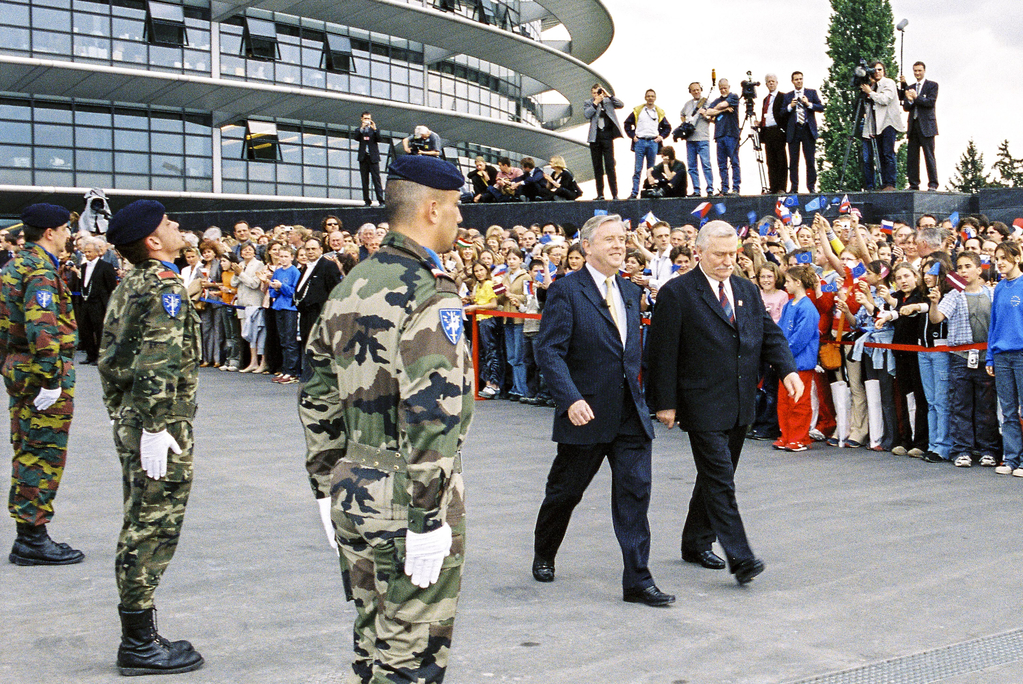 Official ceremony to mark EU enlargement, with guests including the former Polish President Lech Walesa (R), the Presidents or Vice-Presidents of the Parliaments of the new Member States and EU ambassadors and EP President Pat Cox. © European Communities 2004
Official ceremony to mark EU enlargement, with guests including the former Polish President Lech Walesa (R), the Presidents or Vice-Presidents of the Parliaments of the new Member States and EU ambassadors and EP President Pat Cox. © European Communities 2004
The winner of the Nobel Prize for Literature and Irish poet, Seamus Heaney wrote: ‘on a day when newcomers appear, let it be a homecoming’. This was such a day. This was a homecoming. What would have seemed an impossible dream in 1989 when first I arrived as a member of the European Parliament now was a reality and by my side stood Lech Walesa ‘as a visible sign of the struggle for a united Europe.’ ‘The endeavour is accomplished’, he remarked, ‘The will of an earlier generation is being fulfilled.’
It would be easy to suggest an exaggerated role for the European Parliament or for oneself in this extraordinary journey. A sense of proportionality, knowledge of the political and institutional complexity and a sense of history would suggest a more modest claim. In essence, we were called upon to do our duty before our fellow Europeans, true to our vocation as directly elected European parliamentarians. We were called to play our part in redressing the legacy and weighty burden of our continent’s divided history and to help pave the way towards a new Europe. We did that. We did our duty. The legacy of that duty more than of ourselves will endure and will stand the test of time.
I congratulate the President of the Parliament on this initiative and thank him for his invitation to me to participate. I also congratulate the European Parliament, its members and its and their staff on this 50th anniversary and wish them well for the future. Their success will be Europe’s success.
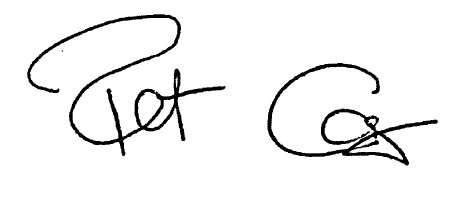
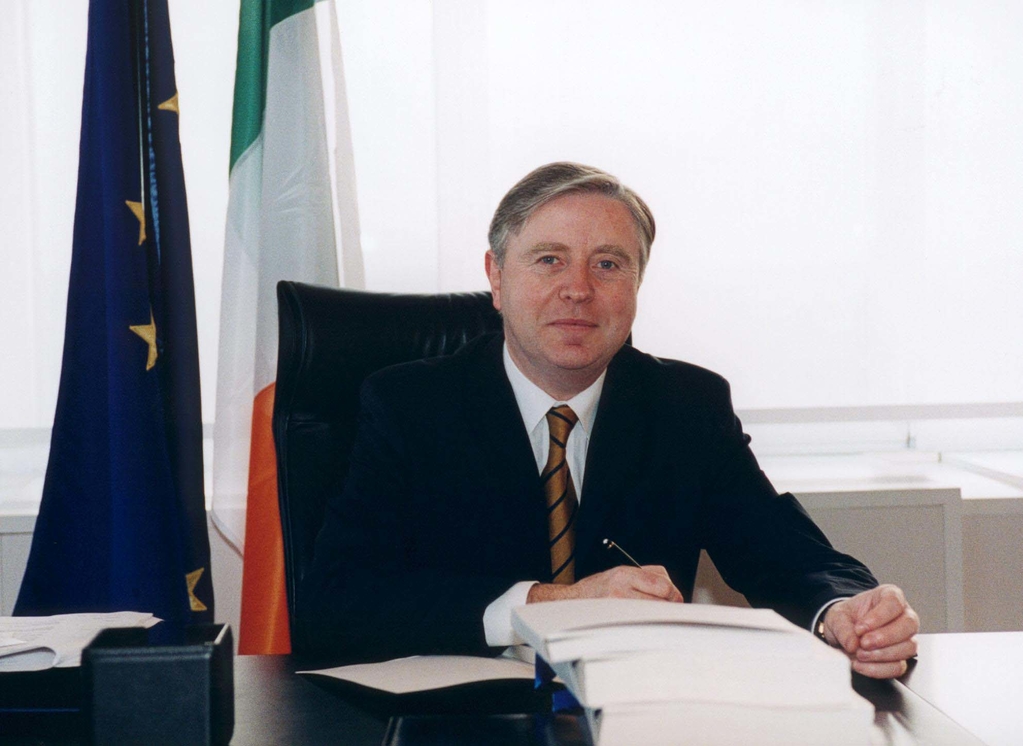 Portrait of Pat Cox, EP President © European Union 2002 – European Parliament
Portrait of Pat Cox, EP President © European Union 2002 – European Parliament
 Plenary session in Strasbourg - Election of Pat Cox as EP President © European Union 2002 – European Parliament
Plenary session in Strasbourg - Election of Pat Cox as EP President © European Union 2002 – European Parliament
 Plenary session at the European Parliament in Strasbourg - Signature ceremony of the Accession Treaty. Pictured (L-R): Elmar Brok, Pat Cox, Gunter Verheugen, Reinhard Rack © European Communities 2003 – European Parliament
Plenary session at the European Parliament in Strasbourg - Signature ceremony of the Accession Treaty. Pictured (L-R): Elmar Brok, Pat Cox, Gunter Verheugen, Reinhard Rack © European Communities 2003 – European Parliament
 Official ceremony to mark EU enlargement, with guests including the former Polish President Lech Walesa (R), the Presidents or Vice-Presidents of the Parliaments of the new Member States and EU ambassadors and EP President Pat Cox. © European Communities 2004
Official ceremony to mark EU enlargement, with guests including the former Polish President Lech Walesa (R), the Presidents or Vice-Presidents of the Parliaments of the new Member States and EU ambassadors and EP President Pat Cox. © European Communities 2004
